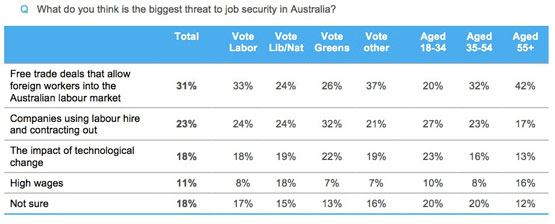If the same-sex marriage plebiscite is blocked, most voters, including many Coalition voters, want a parliamentary vote to determine the matter, this week’s Essential Report suggests.
With the government’s proposed plebiscite bill looking likely to fail in the Senate, 53% of voters say there should be a vote in Parliament if the bill is blocked, while 29% say there should not be. Greens and Labor voters strongly support a parliamentary vote, but more Coalition voters — 46% — support a parliamentary vote than oppose one — 38%. Even “other” voters (voters other than Labor, Coalition and Greens), who tend to be socially conservative, support a vote, 53%-32%.
And voters are hardening their views on the issue, with support for the government’s proposed plebiscite question at twice the level of opposition, and a falling number of don’t knows. In response to the government’s proposed (and much-criticised) question “Should the law be changed to allow same-sex couples to marry?”, 60% of voters say yes and 30% say no, with 10% don’t knows. When the mooted question was first used as the basis for the question in August, as opposed to a generic question on support for same-sex marriage, the result was 57%-28% with 15% undecided. There’s majority support among all demographics and voting groups, although men, older voters, Coalition voters and “other” voters are less supportive.
However, there’s less difference between voters on the question of funding the Yes and No campaigns — in response to the government’s proposal that $7.5 million be handed to both sides for advertising, with spending overseen by a “citizen’s assembly” of worthies, 68% of voters oppose it while 22% support it; remarkably, 46% of voters strongly disapprove of the funding.
However, nearly half of Australians believe that a plebiscite on same-sex marriage could lead to hate speech and abuse of gay and lesbian communities: 48% are concerned that could happen, including 22% who are very concerned, compared to 39% who are not concerned; Coalition voters are the only group who are less concerned about the prospect.
On voting intention, the Coalition is down another point on its primary vote to 37%, around five points down from the election and the same level as Labor, while the Greens remain on 10%. One Nation is up a point to 6% while NXT is on 4%, for an unchanged two-party preferred outcome of 52%-48% in Labor’s favour.
With One Nation and NXT commanding 10% of the vote between them, it’s noteworthy that, in response to questions about job security, it is free trade that alarms voters more than anything else. Asked “what do you think is the biggest threat to job security in Australia?”, 31% nominated “free trade deals that allow foreign workers into the Australian labour market” while 18% nominated “technological change” and just 11% nominated traditional employer whipping boy “high wages”. And look at the way voters split on the issues:
Coalition voters are more likely to blame high wages; Greens voters are more likely to blame employers contracting work out, and “other” voters exceed even Labor voters in blaming free trade. Older voters tend to blame both free trade and high wages, reflecting that Coalition and “other” voters skew old.
However, both Greens and “other” voters are both more likely to say that they think they won’t be working for the same employer in five years’ time compared to Labor and Coalition voters — possibly because Greens voters have a higher proportion of more mobile knowledge workers with highly transferable skills, while “other” voters, as we’ve seen before, tend to be more pessimistic about the economy and assume it is getting worse for them.










I’ve being saying for at least two years now…it’s ALL ABOUT JOBS!
According to many analyses of the Hanson vote…this is the number one issue for these people. Not that their icon [Pauline] can/will do anything for them.
It all rests with the Labor party, and the sooner they realise what is going on here the better.
The LN/P are only interested in creating a pool of unemployed with their so-called free trade agreements. That way the Aussie worker will be forced to accept lower wages if they want a job at all…and the employers will be able to increase inequality.
Ultimately, I think the western world is heading for revolution…bring it on!!
If the answer is HON then it is a very stupid question but what can expect of a population whose legitimate concerns have been ignored & spurned since the HawKeating Accord in the 80s.
Almost two generations whose wages, conditions and aspirations have been systematically & systemically degraded.